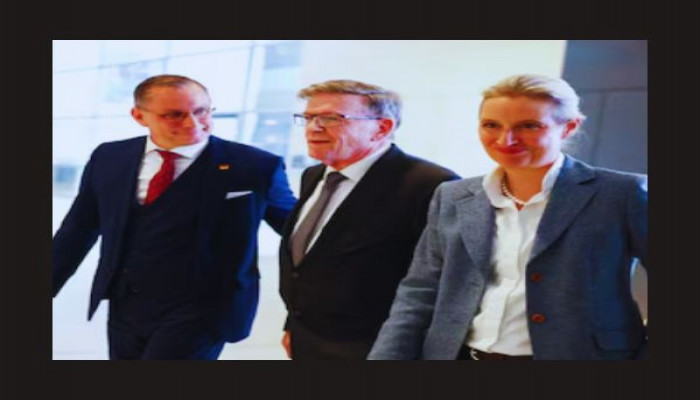Far-Right AfD overtakes rivals in landmark poll, undermining Merz’s path to Chancellorship
- In Reports
- 07:45 PM, Apr 09, 2025
- Myind Staff
Germany’s far-right Alternative for Germany (AfD) party has taken the lead in a major national opinion poll for the first time, signalling mounting public frustration with the country’s mainstream political forces. The poll results, published on Wednesday by the Ipsos Institute, dealt a significant blow to Friedrich Merz, the chancellor-in-waiting and leader of the conservative CDU/CSU bloc, who is in the midst of forming a coalition government.
The Ipsos poll showed the AfD securing 25% of public support, a three-point increase, while Merz’s CDU/CSU alliance saw its support drop by five percentage points to 24%. This shift follows the February 23 federal election, in which the CDU/CSU bloc emerged victorious, but without a clear majority.
Rising Support for AfD Amid Coalition Talks
The surge in backing for the AfD, which finished second in the February election, marks the strongest performance by a far-right party in Germany since the end of World War Two. The development places additional pressure on Merz, who has been striving to reclaim votes from the AfD and form a stable government.
Meanwhile, the Social Democrats (SPD), led by outgoing Chancellor Olaf Scholz, maintained steady support at 15%, according to the poll. The SPD is currently engaged in coalition negotiations with Merz’s CDU/CSU bloc. Both sides are reportedly working to reconcile differences on sensitive issues such as tax policies and migration in a bid to prevent the far-right from gaining a foothold in government.
Sources close to the discussions indicated that the coalition talks are expected to wrap up later on Wednesday.
AfD Celebrates Milestone Poll Result
Reacting to the breakthrough, AfD co-leader Alice Weidel expressed optimism about her party’s momentum. In a statement posted on X (formerly Twitter), she wrote,“The people want political change – and not a ‘business as usual’ coalition of CDU/CSU and SPD.”
The AfD’s rise in the polls underscores a broader sentiment of dissatisfaction with traditional political leadership and points to a potentially transformative shift in Germany’s political landscape.
As the coalition negotiations near their conclusion, all eyes remain on whether Merz can form a government capable of stabilising the political environment—and halting the far-right’s rise.







Comments